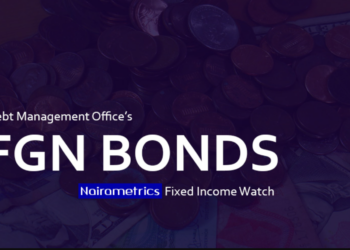The Debt Management Office (DMO) has successfully allotted a total of N4.34 billion in the April 2025 issuance of the Federal Government of Nigeria (FGN) Savings Bonds.
This is according to data published on DMO’s official website.
The allotment, which ran during the offer period from April 7 to 11, 2025, saw investors subscribe to two tenors: a 2-year bond maturing on April 16, 2027, and a 3-year bond maturing on April 16, 2028.
Both bond series are set to settle on April 16, 2025, with coupon payments scheduled quarterly on July 16, October 16, January 16, and April 16 throughout their duration.
Breakdown of Allotment
- The 2-year FGN Savings Bond, offered at a coupon rate of 16.05%, recorded a total allotment of N1.135 billion across 862 successful subscriptions.
- The 3-year FGN Savings Bond, which carries a higher yield of 17.05%, garnered stronger interest, with a total allotment of N3.203 billion from 1,293 successful subscriptions.
Offer Details
- Units of Sale: N1,000 per unit, subject to a minimum subscription of N5,000 and in multiples of N1,000 thereafter, up to a maximum of N50,000,000
- Interest Payment: Quarterly
- Redemption: Bullet repayment on the maturity date
The savings bonds, designed primarily for retail investors, continue to attract strong participation as Nigerians seek safer and more predictable returns amid broader market uncertainties.
- The relatively high interest rates for the April offer underscore the government’s bid to raise domestic capital while offering attractive yields to encourage savings.
- The FGN Savings Bond program, launched in 2017, aims to deepen the domestic bond market, enhance financial inclusion, and provide retail investors with access to government securities.
- With allotments consistently surpassing the billion-naira mark, the instrument remains a reliable tool for individual investors seeking low-risk investment opportunities backed by the federal government.
More insights
FGN Savings Bond qualifies as a security in which trustees can invest under the Trustee Investment Act, and also qualifies as a government security under the Company Income Tax Act (CITA) and Personal Income Tax Act (PITA), enabling tax exemption status for pension funds and other eligible investors.
- In addition, the bonds are listed on the Nigerian Exchange Limited (NGX), thereby offering investors flexibility in liquidity through the secondary market. It also qualifies as a liquid asset for the purpose of computing liquidity ratios for banks.
- Over the years, FGN savings bonds have gained popularity among Nigerians seeking risk-free investment options.
- With inflation concerns and fluctuating interest rates in traditional savings instruments, government bonds provide a stable and predictable return on investment.



















